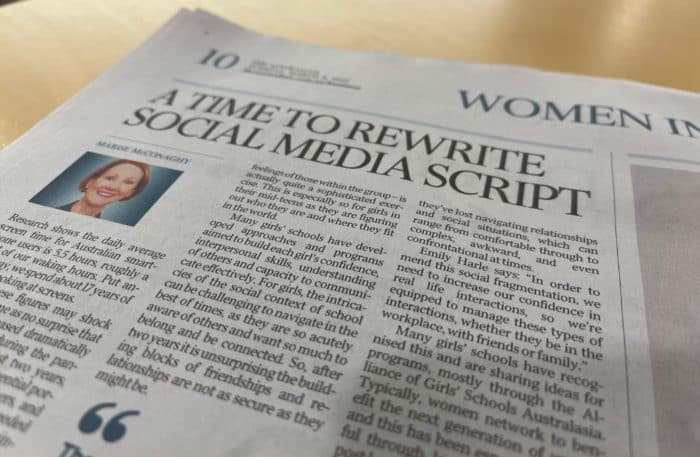In the Media: The Australian, Women in Education By MARISE McCONAGHY, March 8, 2022
Research shows the daily average screen time for Australian smartphone users is 5.5 hours, roughly a third of our waking hours. Put another way, we spend about 17 years of our lives looking at screens.
While these figures may shock some, it will come as no surprise that screen time increased dramatically for all age groups during the pandemic. During the past two years, digital devices became essential portals to family, friends, teachers, and colleagues, facilitating much needed connection, learning, entertainment, and escapism.
While technology has provided a social life raft for many during the pandemic, particularly young people, it has also impacted their ability to interact and connect face-to-face. I believe this is one of the biggest challenges facing girls right now. Strathcona Girls Grammar’s issues and actions leader, Emily Harle, puts it well when she says: “It is not that we’re not well socialised, we’ve stayed connected throughout the past two years via social media, however a lack of confidence in group settings challenges these social interactions. We are so used to communicating online and regard this setting as comfortable and safe, that we’ll often resort to it in uncomfortable situations.”
While friendships and social interactions conducted online can be authentic and meaningful, they are still filtered by devices. In contrast, being present with an individual or a group of people – with the complexity of cross weaving interactions and discussions and cognisance of the feelings of those within the group – is actually quite a sophisticated exercise. This is especially so for girls in their mid-teens as they are figuring out who they are and where they fit in the world.
We’ve all experienced some level of exhaustion as we have moved almost entirely from interacting only with those in our homes to speaking with lots of different people in the course of a day. Our girls have had this to deal with and more, as they have come into this school year with little experience in nuance, reading non-verbal communication, or the give and take in free form conversations which they would normally have in their repertoire. Even speaking on the phone is not necessarily easy for them and they far prefer messaging when possible. This is not to say that all is lost. I have every confidence that girls can learn these important social skills. And as teachers and parents we need to support them in making up for the valuable time they’ve lost navigating relationships and social situations, which can range from comfortable through to complex, awkward, and even confrontational at times.
Emily Harle says: “In order to mend this social fragmentation, we need to increase our confidence in real life interactions, so we’re equipped to manage these types of interactions, whether they be in the workplace, with friends or family.”
Many girls’ schools have recognised this and are sharing ideas for programs, mostly through the Alliance of Girls’ Schools Australasia. Typically, women network to benefit the next generation of women and this has been especially powerful through lockdowns and in the post lockdown phase. There is some physical dependence on devices, particularly phones, which is understandable given they have been our lifelines over the past two years. I think it is important for us to encourage girls to break away from their phones in both a physical and mental sense and be “in the moment” during conversations, even if they feel a little unanchored.
Young people tend to revert to using devices, especially phones, almost as a safety blanket when they’re not feeling confident or when they find that being in the moment is quite exhausting. For this reason, we are working with our students, building up their capacity for in-person interactions and having discussions about relationships.
Developing confidence in social situations isn’t easy. We can help our girls by encouraging them and giving them opportunities to practice, and by demonstrating patience and kindness when they don’t always get it right or are hesitant to leave the safety of a screen.
–
Marise McConaghy is president of Alliance of Girls’ Schools, Australasia and principal of Strathcona Girls Grammar.


